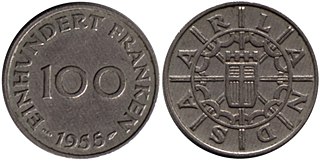
The franc is any of various units of currency. One franc is typically divided into 100 centimes. The name is said to derive from the Latin inscription francorum rex used on early French coins and until the 18th century, or from the French franc, meaning "frank".

Liechtenstein, officially the Principality of Liechtenstein, is a doubly landlocked German-speaking microstate located in the Alps between Austria and Switzerland. It is the sixth smallest nation worldwide. Liechtenstein is a semi-constitutional monarchy headed by the prince of Liechtenstein.

The German Confederation was an association of 39 predominantly German-speaking sovereign states in Central Europe. It was created by the Congress of Vienna in 1815 as a replacement of the former Holy Roman Empire, which had been dissolved in 1806.
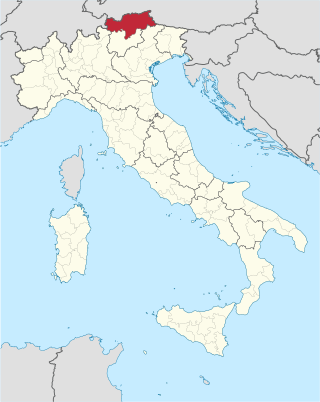
South Tyrol is an autonomous province in Northern Italy. An English translation of the official German and Italian names could be the Autonomous Province Bolzano – South Tyrol, reflecting the multilingualism and different naming conventions in the area. Together with the Autonomous Province of Trento, South Tyrol forms the autonomous region Trentino-Alto Adige/Südtirol. The province is the northernmost of Italy, the second largest with an area of 7,400 square kilometres (2,857 sq mi), and has a total population of about 534,000 inhabitants as of 2021. Its capital and largest city is Bolzano.
Standard High German (SHG), less precisely Standard German or High German, is the umbrella term for the standardized varieties of the German language, which are used in formal contexts and for communication between different dialect areas. German is a pluricentric Dachsprache with currently three codified specific national varieties: German Standard German, Austrian Standard German and Swiss Standard German.
Tyrol or Tirol is a historical region in the Eastern Alps, divided since 1919 into Western Austria and Northern Italy.

Trentino-Alto Adige/Südtirol is an autonomous region of Italy, located in the northern part of the country. The region has a population of 1.1 million, of whom 62% speak Italian as their mother tongue, 30% speak South Tyrolean German and several foreign languages are spoken by immigrant communities. Since the 1970s, most legislative and administrative powers have been transferred to the two self-governing provinces that make up the region: the province of Trento, commonly known as Trentino, and the province of Bolzano, commonly known as South Tyrol. In South Tyrol, German remains the sizeable majority language.

Northeast Italy is one of the five official statistical regions of Italy used by the National Institute of Statistics (ISTAT), a first level NUTS region and a European Parliament constituency. Northeast encompasses four of the country's 20 regions:
This article details the geographical distribution of speakers of the German language, regardless of the legislative status within the countries where it is spoken. In addition to the German-speaking area in Europe, German-speaking minorities are present in many countries and on all six inhabited continents.

Trentino, officially the Autonomous Province of Trento, is an autonomous province of Italy, in the country's far north. Trentino and South Tyrol constitute the region of Trentino-Alto Adige/Südtirol, an autonomous region under the constitution. The province is composed of 166 comuni (municipalities). Its capital is the city of Trento (Trent). The province covers an area of more than 6,000 km2 (2,300 sq mi), with a total population of 541,098 in 2019. Trentino is renowned for its mountains, such as the Dolomites, which are part of the Alps.
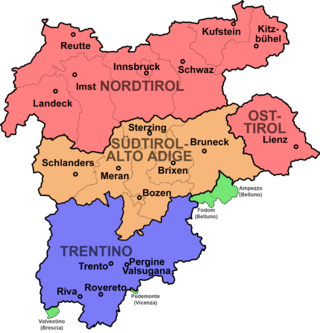
Modern-day South Tyrol, an autonomous Italian province created in 1948, was part of the Austro-Hungarian County of Tyrol until 1918. It was annexed by Italy following the defeat of the Central Powers in World War I. It has been part of a cross-border joint entity, the Euroregion Tyrol-South Tyrol-Trentino, since 2001.
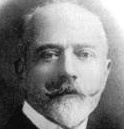
Ettore Tolomei was an Italian nationalist and fascist. He was designated a Member of the Italian Senate in 1923, and ennobled as Conte della Vetta in 1937.

The Rat für deutsche Rechtschreibung, or RdR, is the main international body regulating Standard High German orthography.
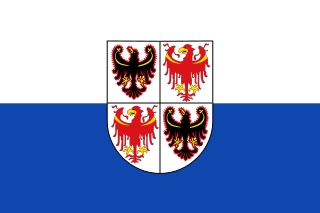
The Politics of Trentino-Alto Adige/Südtirol takes place in a framework of a parliamentary representative democracy, whereby the President of Regional Government is the head of government, and of a pluriform multi-party system. Executive power is exercised by the Regional Government and Legislative power is vested in both the government and the Regional Council. However, since a constitutional reform in 1972, almost all the executive and legislative powers are devolved to the two provinces of which the region is composed: Trentino and the South Tyrol.

The Tyrol–South Tyrol–Trentino Euroregion is a Euroregion formed by three different regional authorities in Austria and Italy: the Austrian state of Tyrol and the Italian autonomous provinces of South Tyrol and Trentino.
Celebrate the Day is a single by Herbert Grönemeyer featuring duo Amadou et Mariam that was served as the official anthem of the 2006 FIFA World Cup held in Germany. Next to English version, Grönemeyer also recorded a German-language version called Zeit, dass sich was dreht with a slightly different text and meaning. The song appears on the CD Zeit, dass sich was dreht.
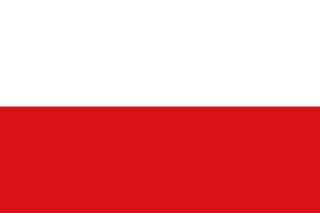
Tyrol is a historical region in the Alps of Northern Italy and western Austria. The area was historically the core of the County of Tyrol, part of the Holy Roman Empire, Austrian Empire and Austria-Hungary, from its formation in the 12th century until 1919. In 1919, following World War I and the dissolution of Austria-Hungary, it was divided into two modern administrative parts through the Treaty of Saint-Germain-en-Laye:
Freemasonry in Luxembourg traces its local origins to the 18th century. Though the practice of Freemasonry was suppressed by the reigning Austrian Habsburg dynasty, it enjoyed a revival under Napoleonic rule that persisted after the close of his reign. After their initial founding, Masonic lodges in Luxembourg rapidly developed strong ties with their French and Belgian counterparts. While suppressed again under Nazi rule, postwar Freemasonry forged stronger ties with the Anglo-American extension of the brotherhood, though the oldest lodges still use the French form of Masonic ritual.
The Deutschsprachige Konferenz der Pfadfinderverbände (DSK) is the international community of Scouting organizations in the German-speaking countries, an umbrella of Central European organizations within the World Organization of the Scout Movement or World Association of Girl Guides and Girl Scouts, including Austria, Luxembourg, Switzerland, France (Alsace), South Tyrol (Italy), the German-speaking Community of Belgium, and Liechtenstein. Its members are internationally recognized German Scouting associations and the minority German-speaking Scouting associations.

Germany–Liechtenstein relations are the diplomatic relations between Germany and Liechtenstein. Both states are members of the Organization for Security and Cooperation in Europe (OSCE), the Council of Europe and the European Economic Area.














